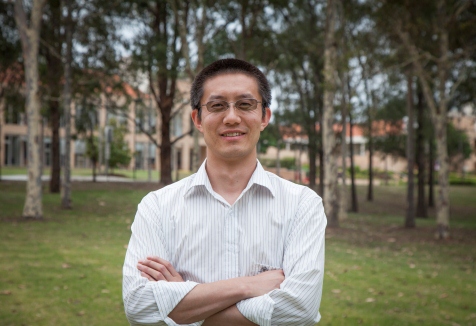Wiser water

Water: it’s one of the most important and precious resources in the world. It’s also easily taken for granted in areas fortunate enough to have a ready supply. So what’s being done around the world to make this resource accessible to everyone?
Here at UWS, Dr Guodong Du, from the School of Computing, Engineering and Mathematics, has been awarded a prestigious Postdoctoral Research Fellowship by the Australian Solar Institute to undertake a project that aims to purify water using solar energy. He will conduct the project with colleagues at UWS as well as researchers from the University of Wollongong; University of Newcastle; University of Maryland, USA; Helmholtz Center, Germany; and University of Tsukuba, Japan.
“Solar energy, radiant light and heat from the sun have been harnessed by humans since ancient times using a range of ever-evolving technologies,” says Guodong. “In countries where many people do not have access to clean water, there is a need for it to be cheaply and effectively purified. Even when it looks clear, water can carry countless microscopic germs. This project will investigate the use of solar energy to remove microbial agents, such as E. coli bacteria, from the water.”
The development of technology that uses solar energy to purify water will have benefits not only for Australians but for developing countries around the world.
Here in Australia, Guodong says the project may attract the interest of industrial partners, such as water companies. “Moreover, it will provide the chance to take the lead at the forefront of green energy research,” says Guodong. “It also provides an excellent training ground for postgraduate students and researchers, which will allow them to develop their skills in chemistry, materials science, and solar energy technology.”
There are other purposes for this research, too, says Guodong. “Besides water purification, the other application would be solar fuel generation, which would be one of the most attractive methods to use the green energy in future.”
The project, titled “TiO2-Based Systems for Solar Water Oxidation: Effect of Nano-Size Structures and Composition on Solar Water Disinfection and Solar Hydrogen Generation – the Solid State Science Approach”, is a long-term project that will run for three years funded by the Australian Solar Institute.
For more information on this project, read the Research Directions summary (opens in a new window). To find out about other exciting research projects at UWS, visit the Research Success webpage (opens in a new window).
Mobile options:

